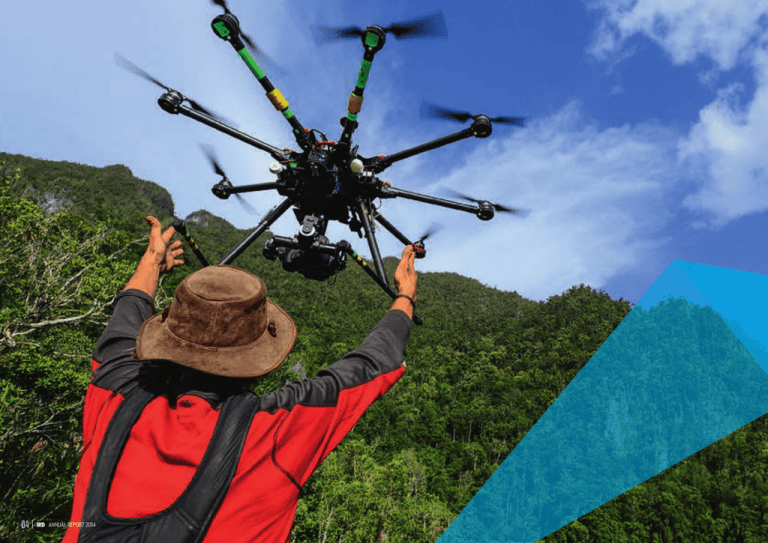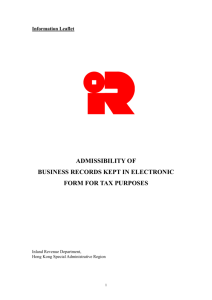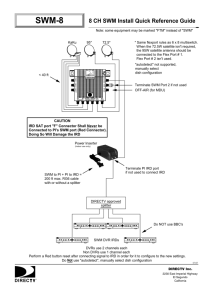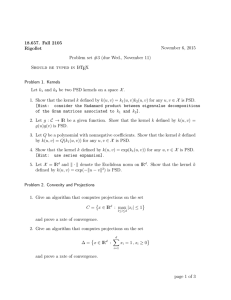04 S 2014 IRD IRD
advertisement

2014 IRD S 04 IRD ANNUAL REPORT 2014 2014 IRD 2014 IRD 06 The IRD around the world 07 Editorial 08 Key figures for 2014 IRD in brief 09 Highlights of 2014 IRD ANNUAL REPORT 2014 05 2014 IRD THE IRD AROUND THE WORLD THE IRD AROUND THE WORLD EXPATRIATE, SECONDED, LOCAL STAFF Staff at 31/12/12 Source Personnel Department IRD centre or office 1-9 10-18 20-28 31-50 91-130 staff staff staff staff staff members members members members members Other form of presence 1-9 10-18 staff staff members members Centre in overseas territories FRANCE 1 ,352 staff members United States TUNISIA MOROCCO Lebanon Nepal EGYPT MEXICO Haiti MARTINIQUE Colombia FRENCH GUIANA ECUADOR FRENCH POLYNESIA SENEGAL Mali THAILAND Guinea CÔTE D’IVOIRE BENIN CAMEROON Uganda KENYA MADAGASCAR BOLIVIA REUNION 06 IRD ANNUAL REPORT 2014 SOUTH AFRICA Cambodia Ethiopia Seychelles Comoros BRAZIL CHILE LAOS VIETNAM BURKINA FASO Gabon PERU India NIGER Guadeloupe INDONESIA East Timor Vanuatu NEW CALEDONIA 2014 IRD EDITORIAL EDITORIAL IRD’S NEW GOVERNANCE CONSOLIDATING ACHIEVEMENTS AND RISING TO NEW CHALLENGES IN RESEARCH FOR DEVELOPMENT Jean-Paul Moatti, Chairman & Executive Director T his progress report from the Institute looks back at 2014, the last year under the responsibility of the previous governing body headed by Professor Michel Laurent, to whom we owe a huge thank you for his contribution to our organisation’s work, as Executive Director then Chief Executive Officer. This report shows, if proof were necessary, that IRD remains a significant contributor to scientific research in the Frenchspeaking world, and that it continues to be a strategic element in French policy on development aid for countries of the South. The entire report demonstrates that, through research excellence, IRD endeavours to rise to the great challenges faced by these countries and the rest of the world: environmental changes, biodiversity loss, rarefaction of soil and water resources, vulnerability to natural risks, emergence of infectious diseases, the growth in so-called "civilisation" diseases, and deepening economic inequalities resulting in increasingly unacceptable social discrepancies in terms of access to resources, education and the healthcare system. Over the coming months, the Institute’s new governing body, set up after my appointment as Chief Executive Officer by a Council of Ministers’ decree on 11 March 2015, and my nomination of Jean-Marc Châtaigner as Deputy Executive Director, will focus on preparing the new performance contract for 2016-2020 in the best possible conditions. To ensure that the drafting on the new performance contract is based on cross-disciplinary scientific programming, I have tasked the Institute’s Scientific Council, backed by all our scientific bodies and staff, with reflection work ahead of a report on the current scientific situation and outlook, to be submitted to me this autumn. That report should help make sure that research for development and scientific partnerships with the South are better integrated in the ten social challenges that now form the priority focus areas for research in France, in accordance with the European Union programme, Horizon 2020, and the national research strategy currently being drafted. The report will be of major importance when it comes to drafting IRD’s 2015-2030 strategic plan, which will be finalised by the end of this year, with support and advice from a strategic policy committee made up of high-ranking personalities from the world of science and development, who have agreed to help us with this. The 2015-2030 strategic plan will set out the medium and long-term prospects and define a framework for the shorter-term discussions on our new performance contract. Following the abolition of the former AIRD (inter-institutional research agency for development), the consequences of which are described in this report, it seems clear to me that one of the main challenges in our strategic plan will be defining how IRD can position itself as a key player in the outreach to the South by the five alliances (AllEnvi, Allistene, Ancre, Athéna and Aviesan) that now form a framework for the pooling of French public research. Another important aspect will be better rooting IRD’s activities within scientific diplomacy work serving our country and the French-speaking world as a whole. This implies the promotion of cross-disciplinary work to address the main challenges of the developing world, efforts to build research and innovation capacities for our partners in the South, and greater responsiveness to the environmental, geopolitical or healthrelated crises that regularly affect these parts of the world. 2015 will bring us numerous opportunities to demonstrate that science can help reconcile the various "agendas" that reign over the complexity of NorthSouth relations in a depolarised world: the agenda on wealth distribution worldwide, at the heart of the Third International Conference on Financing for Development to be held in Addis Ababa in July under the auspices of the United Nations; the agenda for the reconciliation of economic growth and respect for ecological, social and cultural balances which will inspire the launch of the post-2015 sustainable development objectives at a United Nations summit in New York in September; and finally, the climate change agenda, negotiations over which will culminate with the 21st Conference of the Parties of the United Nations Framework Convention (COP21) in Paris in December. Following on from the commitment made by the Institute’s researchers to their Peruvian partners at the previous conference (COP 20) in Lima, the details of which are included in this report, IRD will work closely with other French public research organisations and universities to try and show how the excellence of its research partnership approach may enlighten certain decision-making processes concerned with these global issues. Preparation of the next performance contract also means we now need to speed up the modernisation of IRD’s management, with the aim of making more efficient use of our budgets for research, consolidating our scientific partnership arrangements with countries of the South, making progress in terms of parity and the employment of people with disabilities, and increasing our attractiveness among young researchers. In short, 2015 and the years to come are brimming with potential for IRD, but we will need to apply ourselves and remain entirely rigorous in our work. IRD ANNUAL REPORT 2014 07 2014 IRD KEY FIGURES FOR 2014 - IRD IN BRIEF KEY FIGURES FOR 2014 THE IRD STAFF RESEARCH 2.221 56 including 835 researchers, 935 engineers and technicians and 451 local staff consortiums and 7 observatories STAFF MEMBERS 39% OF STAFF MEMBERS OUTSIDE MAINLAND FRANCE RESEARCH 3.682 SCIENTIFIC PUBLICATIONS in 2013 CAPACITY BUILDING 185 BURSARIES allocated to scientists, including dont 147 for theses 42 NEW TEAMS supported in the South 08 IRD ANNUAL REPORT 2014 INNOVATION 116 PATENTS HELD FINANCIAL RESOURCES €237M OF BUDGET 46% €34.4M with Southern countries from conventions and approved products CO-AUTHORED REVENUE IRD IN BRIEF I RD is a research organisation unlike any other in the field of European research for development. It is a French public scientific and technological institution operating under the joint authority of the French Ministry of Higher Education and Research and the Ministry of Foreign Affairs. IRD endeavours to meet major development challenges by undertaking research, training, and innovation activities in the South, for the South, and with the South, with an on-going focus on sharing knowledge and pooling resources and skills. From its headquarters in Marseille and its two centres in metropolitan France (B ondy and Montpellier), it operates in nearly 90 countries in Africa, the Mediterranean, Latin America, Asia and France’s tropical overseas territories. Based on an interdisciplinary approach, the projects carried out with its partners address issues of crucial importance for the countries of the South: tropical diseases and diseases of civilisation, food security, climate change, water resources, biodiversity, the development of societies, social inequality and vulnerability, migration, etc. 2014 IRD HIGHLIGHTS OF 2014 HIGHLIGHTS OF 2014 JANUARY/FEBRUARY/MARCH Lengguru expedition/West Papua APRIL/MAY/JUNE IRD celebrated the fiftieth anniversary of the Niakhar population and health observatory in Senegal Presentation of the expert group review on the development of Lake Chad at N’Djamena Inauguration of the Cambodian regional platform for research into transmissible and emerging infectious diseases in Southeast Asia Review of the European Smiling project on micronutrient deficiencies, held in Vietnam Université Félix Houphouët-Boigny welcomed the new IRD representation from Côte d’Ivoire Inauguration in Marseille of the CVT "Valorisation Sud" head office (Cirad, Institut Pasteur, IRD) 7th international HIV/hepatitis conference for Francophones (AFRAVIH) in Montpellier International forum on "Restoring soil productivity to benefit populations in Haiti" OCTOBER/NOVEMBER/DECEMBER The Bond’Innov incubator organised its second "North/South innovative Study into infectious diseases in Southeast Asia entrepreneurship event" IRD mobilised for action against Ebola, with nine new research programmes IRD took part in the 20th Conference of the parties to the United Nations Framework Convention on Climate Change Lenggurru 2014 expedition in West Papua, the largest ever undertaken in Indonesia Ebola epidemic/Guinea Drought in the Maasai region/ Tanzania IRD ANNUAL REPORT 2014 09







